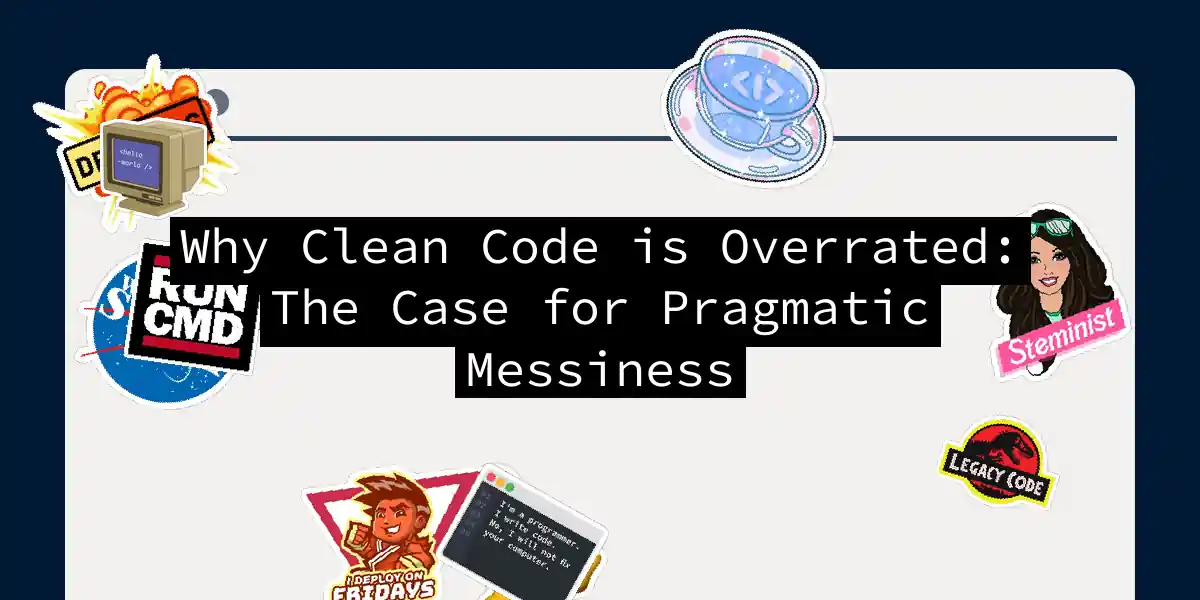The Clean Code Cult: When Perfect Becomes the Enemy of Good
Confession: I’ve written code so clean it would make a preacher proud. But I’ve also shipped code so hacky it would make that same preacher weep. There’s a time and place for both. While Clean Code enthusiasts (and I use that term affectionately) bring valuable principles to the table, their dogmatic application often chokes startups with technical debt disguised as virtue. Let’s dissect why “clean enough” should dethrone “perfect” in the Fast-Paced Pressure Cooker of Startup Life.
The Startup Dilemma: Ships vs. Masterpieces
Startups aren’t gallery openings. They’re minimum viable prototypes built before the runway disappears. Compare two scenarios: Scenario 1: The Clean Code Cathedral
- Spend 2 weeks perfecting abstractions
- Implement full testing suite
- Version all dependencies
- Ship when “everything’s perfect” Scenario 2: The Messy MVP
def validate_users(users): # "Good enough" solution
return len(users) < 10000 # 10k users? That's our growth!
- Ships in 2 hours
- Validated through real users
- Wins first enterprise client While the first approach might give you a PhD in Type Safety, the second gives you traction. Startups don’t lose to beautiful code—they lose to lack of market validation.
The Dirty Truth About Technical Debt
Technical debt isn’t a morality play. It’s strategic capital. Every “quick fix” becomes an investment in the company’s survival. Consider this equation: [ \text{Pragmatic Debt} = \frac{\text{Development Speed} \times \text{validated Assumptions}}{\text{Codebase Maintainability}} ] When to Prioritize Speed:
- Proof-of-concept development
- Rapid prototyping phases
- High uncertainity market validation
- Crises requiring hotfixes When to Clean Up:
The Pragmatic Playbook: 7 Rules for Strategic Messiness
Rule 1: Embrace “Good Enough” Design
// Before: Obsession with Type Safety
function getUserDetails(userId: number) {
if (!Number.isInteger(userId)) throw new Error('userId must be number');
// 50 more lines of validation
}
// After: Focus on Core Use Cases
function getUserDetails(userId) {
try {
return fetch(`/api/users/${userId}`);
} catch (e) {
console.error('Failed to fetch user:', e);
return null;
}
}
Why: Perfection in validation comes at the cost of shipping features that generate revenue.
Rule 2: Technical Debt Accounting
Create a “Debt Ledger” system:
| Location | Debt Description | Interest (Rate) | Due Date |
|---|---|---|---|
| user-auth.ts | Quickfix for JWT parsing | 5% per sprint | Sprint 6 |
| order-backend | Hardcoded currency rates | 10% per sprint | Sprint 4 |
Track but don’t panic about debt—treat it as a financial instrument, not moral failing.
Rule 3: Teamwide Tooling First
Automate the essentials with:
# Lint, format, and test in one command
npm run dev = "prettier --write . && eslint . && jest"
This baseline “clean enough” guardrail prevents catastrophic mess.
The Clean Code Counterarguments: Debunked
Myth #1: “Clean code prevents bugs” Reality: Clean code is no vaccine. A beautifully designed system with a wrong business assumption will fail just as spectacularly. Myth #2: “Messy code always becomes legacy” Reality: Only the code that survives validator becomes legacy. Most prototype code gets thrown away before becoming technical cancer. Myth #3: “Clean coding is free” Reality: Time spent on abstraction is time not spent validating market fit. In startups, every hour is capital burned.
When to Join the Clean Code Cult
Not every situation requires ultrasonic-clean code. But some require gold-plated paradigms:
- Core Business Logic (payment processing, security layers)
- High-traffic APIs (bottlenecks demand optimal code)
- Team Handoff (code becomes shared knowledge)
- Regulated Industries (finance, healthcare) For these cases, write code that screams “I care deeply about this”—but only when justified by business impact.
The Future of Pragmatic Code
Imagine a world where:
Code isn’t a museum piece. It’s a living, breathing organism responding to market pressures. The best developers hold both clean code ideals and business pragmatism closely.
Final Thought: Clean code is like a well-pressed suit—great for job interviews, but useless during a mud run. Join me in embracing strategic messiness—the unconventional practice that just might save your startup’s bacon. (Or at least get you that Series A.)
